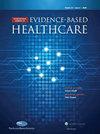健康与科学中的人工智能:反思
Q3 Medicine
International Journal of Evidence-Based Healthcare
Pub Date : 2023-08-31
DOI:10.17267/2675-021xevidence.2023.e5236
引用次数: 0
摘要
导读:每当有一场技术革命,就会有与之相关的优点和缺点。人工智能正在经历这个不确定的阶段。有些团体同意并接受这种新技术,而另一些团体则拒绝让它进入我们的日常生活。目的:这次反思的目的是了解在健康和科学领域使用人工智能的利弊。本文章由计算机程序翻译,如有差异,请以英文原文为准。
Artificial intelligence in health and science: an introspection
INTRODUCTION: Whenever there has been a technological revolution, there have been advantages and disadvantages associated with it. Artificial intelligence is now going through this phase of uncertainty. There are groups that agree and embrace this new technology, and others that simply refuse to let it into our daily lives. OBJECTIVE: The purpose of this reflection will be to understand the advantages and disadvantages of the use of artificial intelligence in health and science.
求助全文
通过发布文献求助,成功后即可免费获取论文全文。
去求助
来源期刊

International Journal of Evidence-Based Healthcare
Medicine-Health Policy
CiteScore
1.80
自引率
0.00%
发文量
39
期刊介绍:
The International Journal of Evidence-Based Healthcare is the official journal of the Joanna Briggs Institute. It is a fully refereed journal that publishes manuscripts relating to evidence-based medicine and evidence-based practice. It publishes papers containing reliable evidence to assist health professionals in their evaluation and decision-making, and to inform health professionals, students and researchers of outcomes, debates and developments in evidence-based medicine and healthcare.
The journal provides a unique home for publication of systematic reviews (quantitative, qualitative, mixed methods, economic, scoping and prevalence) and implementation projects including the synthesis, transfer and utilisation of evidence in clinical practice. Original scholarly work relating to the synthesis (translation science), transfer (distribution) and utilization (implementation science and evaluation) of evidence to inform multidisciplinary healthcare practice is considered for publication. The journal also publishes original scholarly commentary pieces relating to the generation and synthesis of evidence for practice and quality improvement, the use and evaluation of evidence in practice, and the process of conducting systematic reviews (methodology) which covers quantitative, qualitative, mixed methods, economic, scoping and prevalence methods. In addition, the journal’s content includes implementation projects including the transfer and utilisation of evidence in clinical practice as well as providing a forum for the debate of issues surrounding evidence-based healthcare.
 求助内容:
求助内容: 应助结果提醒方式:
应助结果提醒方式:


